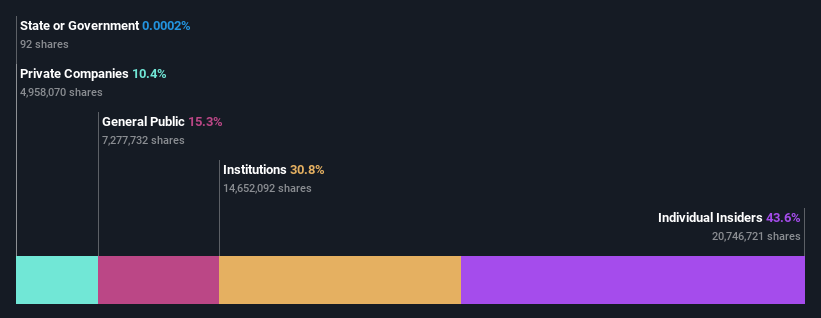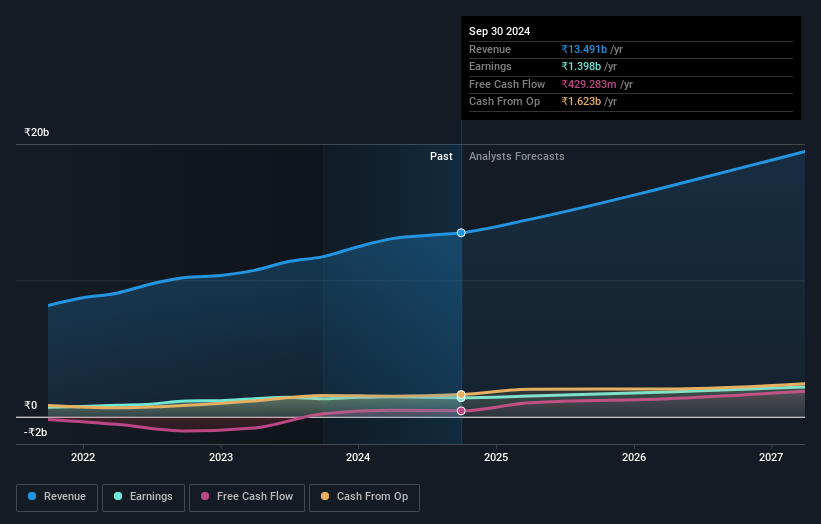Indigo Paints Limited (NSE:INDIGOPNTS) CEO Hemant Jalan, the company's largest shareholder sees 7.8% reduction in holdings value

Key Insights
- Significant insider control over Indigo Paints implies vested interests in company growth
- 55% of the business is held by the top 4 shareholders
- 31% of Indigo Paints is held by Institutions
If you want to know who really controls Indigo Paints Limited (NSE:INDIGOPNTS), then you'll have to look at the makeup of its share registry. With 44% stake, individual insiders possess the maximum shares in the company. That is, the group stands to benefit the most if the stock rises (or lose the most if there is a downturn).
As market cap fell to ₹65b last week, insiders would have faced the highest losses than any other shareholder groups of the company.
Let's delve deeper into each type of owner of Indigo Paints, beginning with the chart below.
View our latest analysis for Indigo Paints

What Does The Institutional Ownership Tell Us About Indigo Paints?
Institutions typically measure themselves against a benchmark when reporting to their own investors, so they often become more enthusiastic about a stock once it's included in a major index. We would expect most companies to have some institutions on the register, especially if they are growing.
As you can see, institutional investors have a fair amount of stake in Indigo Paints. This suggests some credibility amongst professional investors. But we can't rely on that fact alone since institutions make bad investments sometimes, just like everyone does. It is not uncommon to see a big share price drop if two large institutional investors try to sell out of a stock at the same time. So it is worth checking the past earnings trajectory of Indigo Paints, (below). Of course, keep in mind that there are other factors to consider, too.

Indigo Paints is not owned by hedge funds. The company's CEO Hemant Jalan is the largest shareholder with 21% of shares outstanding. Anita Jalan is the second largest shareholder owning 15% of common stock, and Halogen Chemicals Private Limited holds about 10% of the company stock.
Our research also brought to light the fact that roughly 55% of the company is controlled by the top 4 shareholders suggesting that these owners wield significant influence on the business.
Researching institutional ownership is a good way to gauge and filter a stock's expected performance. The same can be achieved by studying analyst sentiments. Quite a few analysts cover the stock, so you could look into forecast growth quite easily.
Insider Ownership Of Indigo Paints
The definition of an insider can differ slightly between different countries, but members of the board of directors always count. Management ultimately answers to the board. However, it is not uncommon for managers to be executive board members, especially if they are a founder or the CEO.
Most consider insider ownership a positive because it can indicate the board is well aligned with other shareholders. However, on some occasions too much power is concentrated within this group.
Our most recent data indicates that insiders own a reasonable proportion of Indigo Paints Limited. Insiders own ₹28b worth of shares in the ₹65b company. This may suggest that the founders still own a lot of shares. You can click here to see if they have been buying or selling.
General Public Ownership
The general public, who are usually individual investors, hold a 15% stake in Indigo Paints. While this size of ownership may not be enough to sway a policy decision in their favour, they can still make a collective impact on company policies.
Private Company Ownership
It seems that Private Companies own 10%, of the Indigo Paints stock. Private companies may be related parties. Sometimes insiders have an interest in a public company through a holding in a private company, rather than in their own capacity as an individual. While it's hard to draw any broad stroke conclusions, it is worth noting as an area for further research.
Next Steps:
It's always worth thinking about the different groups who own shares in a company. But to understand Indigo Paints better, we need to consider many other factors.
I like to dive deeper into how a company has performed in the past. You can find historic revenue and earnings in this detailed graph.
But ultimately it is the future, not the past, that will determine how well the owners of this business will do. Therefore we think it advisable to take a look at this free report showing whether analysts are predicting a brighter future.
NB: Figures in this article are calculated using data from the last twelve months, which refer to the 12-month period ending on the last date of the month the financial statement is dated. This may not be consistent with full year annual report figures.
New: AI Stock Screener & Alerts
Our new AI Stock Screener scans the market every day to uncover opportunities.
• Dividend Powerhouses (3%+ Yield)
• Undervalued Small Caps with Insider Buying
• High growth Tech and AI Companies
Or build your own from over 50 metrics.
Have feedback on this article? Concerned about the content? Get in touch with us directly. Alternatively, email editorial-team (at) simplywallst.com.
This article by Simply Wall St is general in nature. We provide commentary based on historical data and analyst forecasts only using an unbiased methodology and our articles are not intended to be financial advice. It does not constitute a recommendation to buy or sell any stock, and does not take account of your objectives, or your financial situation. We aim to bring you long-term focused analysis driven by fundamental data. Note that our analysis may not factor in the latest price-sensitive company announcements or qualitative material. Simply Wall St has no position in any stocks mentioned.
About NSEI:INDIGOPNTS
Indigo Paints
Engages in the manufacture and sale of decorative paints in India and internationally.
Flawless balance sheet with moderate growth potential.
Similar Companies
Market Insights
Community Narratives




